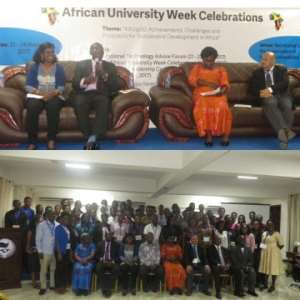
Educational experts at a high level panel discussion organised by the Association of African Universities (AAU) have called for strong partnership between industry and academics to accelerate Ghana's socioeconomic development.
The panellists said such a collaboration would enable universities get funding from industry, whereas industry gets the needed research from universities, while society on the other hand gets new products and technology.
They expressed the hope that a strong collaboration between industry and universities would help prepare graduating students adequately with the requisite skills for employment by industry.
The panellists include Professor Nicholas N. N. Nsowah-Nuamah, President, Regent University College of Science and Technology; Dr Eva Esther Shalin, the Associate Dean, Students Affairs and Collaboration, BlueCrest University College (GH) Limited; Mr Rizwan Ahmad, the Director, IPMC; and Mrs Eva Hazel, the Director of Tertiary Education, Ministry of Education.
The panel discussion forms part of the AAU week celebration on the theme 'AAU@50: Achievements and Prospects for Sustainable Development in Africa'.
It was attended by participants from the Regent University College of Science and Technology, Bluecrest University College, University of Energy and Natural Resources and Koforidua Technical University.
Others are University of Professional Studies, Accra, Knutsford University College, IMPC, Accra Institute of Technology, Ghana Institute of Journalism, Anglican University College of Technology and Wisconsin International University College.
Prof Nsowah-Nuamah said in designing syllabi, there is the need for universities to find out from industries whether the programmes they intend to run is in line with their needs.
He said in addition, the inputs of other stakeholders should be sought before the new programme takes off.
He urged the Government to come out with a new policy that would make industrial attachment compulsory for all tertiary education students; stating that at the moment it was only the Technical Universities and the Polytechnics which were implementing such a policy.
Dr Shalin urged industries to open their doors to the universities; adding that universities must be innovative and proactive.
She advised students to have mentors and to be mindful that research was about global networking.
Mr Ahmad called for a holistic approach in addressing the needs of education and industry.
Mrs Hazel said the Ministry of Education was developing a new policy that would ensure that the syllabi of educational institutions, right from the kindergarten to the tertiary level, is related to industry.
She said the syllabi of educational institutions would be structured in such way that it would give people employable skills.
She said the Ministry would be coming out with a new policy to ensure that students actually benefit from industrial attachments.
Professor Etienne Ehouan Ehile, the Secretary-General of the AAU, reiterated the AAU's commitment to partner with the right institutions in improving the quality of higher education in Africa, as demanded by its mandate.
'The AUU is further playing a key role in promoting and sustaining best practices across high education institutions on the continent,' he said.
GNA
By Iddi Yire, GNA




 April 20: Cedi sells at GHS13.63 to $1, GHS13.06 on BoG interbank
April 20: Cedi sells at GHS13.63 to $1, GHS13.06 on BoG interbank
 Dumsor: I'm very disappointed in you for messing up the energy sector — Kofi Asa...
Dumsor: I'm very disappointed in you for messing up the energy sector — Kofi Asa...
 Dumsor: Instruct ECG MD to issue timetable and fire him for lying — Kofi Asare t...
Dumsor: Instruct ECG MD to issue timetable and fire him for lying — Kofi Asare t...
 Ashanti region: Road Minister cuts sod for 24km Pakyi No.2 to Antoakrom road con...
Ashanti region: Road Minister cuts sod for 24km Pakyi No.2 to Antoakrom road con...
 Train crash: ‘How could any normal person leave a car on rail tracks?’ — Frankli...
Train crash: ‘How could any normal person leave a car on rail tracks?’ — Frankli...
 Train crash: Driver of abandoned vehicle not our branch chairman nor secretary —...
Train crash: Driver of abandoned vehicle not our branch chairman nor secretary —...
 Kenya pays military homage to army chief killed in copter crash
Kenya pays military homage to army chief killed in copter crash
 US agrees to pull troops from key drone host Niger: officials
US agrees to pull troops from key drone host Niger: officials
 Mahama vows to scrap teacher licensure exams, review Free SHS policy
Mahama vows to scrap teacher licensure exams, review Free SHS policy
 Government will replace burnt Madina shops with a new three-story, 120-store fac...
Government will replace burnt Madina shops with a new three-story, 120-store fac...
